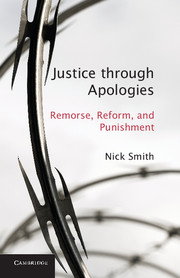Part One - The Penitent and the Penitentiary: Apologies in Criminal Law
Published online by Cambridge University Press: 05 June 2014
Summary
The Penitent and the Penitentiary: Apologies in Criminal Law
[Tlhe concept “punishment” possesses in fact not one meaning but a whole synthesis of “meanings”: the previous history of punishment in general, the history of its employment for the most various purposes, finally crystallizes into a kind of unity that is hard to disentangle, hard to analyze and, as must be emphasized, totally in-definable. (Today it is impossible to say for certain why people are really punished: all concepts in which an entire process is semiotically concentrated elude definition; only that which has no history is definable.).
Nietzsche, Genealogy of MoralsIntroduction: Central Debates in Philosophy of Punishment Relevant to Apologies in Criminal Law
The subsequent chapters make two interrelated arguments. First I argue against court-ordered apologies. I then argue in favor of reducing sentences for categorically apologetic offenders. Considering the interdisciplinary nature of this book and my extensive reference to the central debates in the philosophy of crime and punishment, a brief overview of this literature may be useful for some readers. Those well versed in such arguments may want to skim this section. All readers, however, can take a moment to appreciate an obstacle confronting my arguments: the contemporary United States, I think it is fair to say, has no coherent or consistent set of principles guiding its massive criminal justice system. Instead, we have an ideological storm of highly contestable beliefs blowing in various directions – although most often toward increased incarceration. The push of political currents and pull of economic tides present various difficulties for analyzing the role of apologies. Very few questions regarding why the criminal justice system’s ultimate objectives – for instance, why we punish drug offenses with lengthy sentences – are met with sensible answers. Attempting to carve out a sensible treatment of apologies within such Kafkaesque institutions can feel like a fool’s errand.
- Type
- Chapter
- Information
- Justice through ApologiesRemorse, Reform, and Punishment, pp. 39 - 50Publisher: Cambridge University PressPrint publication year: 2014



